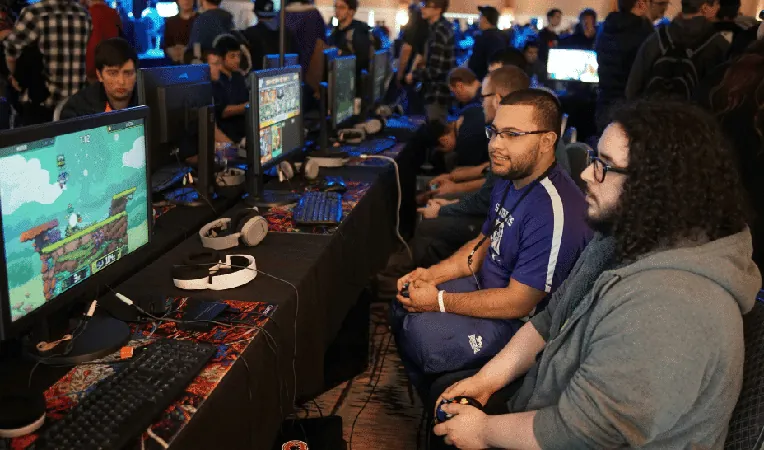
Achievement Unlocked: How Video Games Are Transforming Our World!
2024-12-31
Author: Ming
From the simple bounce of a pixelated ball in Pong to an entertainment juggernaut worth an astonishing €177.7 billion in 2022, video games have evolved beyond mere entertainment; they are now a transformative force in society. This staggering growth significantly eclipses the combined revenues of the music market (€25.2 billion) and the global film industry (€25 billion), establishing gaming as a formidable pillar in the entertainment ecosystem.
Video Games as Social Platforms: Creating Connections Worldwide
Modern gaming has transformed into vibrant social platforms, enabling relationships across continents. A compelling study from the University of Sharjah highlighted that 90.7% of Emirati university students preferred gaming with friends, showcasing how video games foster social interaction. However, there's a duality to this phenomenon, as 43.59% reported feelings of isolation from excessive gaming.
Experts echo these sentiments—Andrew Fishman from the Response Center for Teens emphasizes how games create digital spaces for engagement and collaboration. Furthermore, sports video games have promoted real-world athletic participation, with statistics revealing that 89% of players in this genre are physically active in their sport of choice.
For those with social anxiety or physical challenges, video games can open the door to socialization. A study from the Sunnaas Rehabilitation Hospital revealed the powerful impact of virtual gaming for individuals with spinal injuries, who found a sense of belonging in the gaming community, transcending the limitations of their physical conditions.
Educational Innovations: Learning Through Play
Video games are also making waves in education, with interactive titles like Minecraft: Education Edition and Assassin's Creed Discovery Tour being adopted in classrooms to teach coding, mathematics, and history in engaging ways. Research indicates that frequent gamers exhibit cognitive skills equivalent to individuals approximately 13.7 years younger.
The rise in user-generated content (UGC), notably in platforms like Roblox, allows players to become creators, enhancing both learning and creativity. Schools are harnessing this potential, providing students with opportunities to learn essential skills in game design while fostering innovation.
Therapeutic Breakthroughs: Games Heal
The intersection of gaming and mental health is gaining traction, especially with titles like Vampire Therapist, which employs cognitive behavioral therapy techniques to address anxiety and depression. The pandemic brought attention to the therapeutic role of gaming, with Animal Crossing: New Horizons serving as an escapist haven during lockdowns. Research from Penn State's Media Effects Research Lab indicated that players sought solace and social interaction within the game, fulfilling their social needs markedly disrupted by global isolation.
Even museums have recognized this trend; the National Videogame Museum launched the Animal Crossing Diaries, a digital exhibit documenting players' experiences during lockdown.
European Innovators: Pioneering the Future of Gaming
Across Europe, innovative startups are leveraging the power of games to tackle social, educational, and health challenges. For example:
- Quell in London integrates fitness into gaming, raising €8 million for innovative hardware that promotes an active lifestyle through gameplay.
- Improbable, also in London, is pioneering metaverse experiences, recently achieving profitability while designing extensive virtual worlds for social engagement.
- PortalOne from Oslo is merging gaming and television for an immersive entertainment experience, backed by €53.64 million in Series A funding.
- Mainframe Industries in Helsinki is developing cloud-native multiplayer online games, successfully raising €17.3 million for their upcoming title Pax Dei.
- RIVRS in Rennes emphasizes player-generated content, securing €4 million in seed funding to facilitate creativity across gaming platforms.
Beyond Entertainment: The Expansive Potential of Gaming
Video games are no longer confined to just fun and games; they are reshaping how we interact, learn, and heal. With their unique capacity for interactivity, games have the potential to create inclusive environments and innovative educational methods.
As new developers continue to emerge and explore the multifaceted roles of video games, we can only speculate—what's next? From breaking down barriers for individuals with disabilities to revolutionizing learning and mental health treatment, the future of video games is undeniably promising and filled with opportunities for a more connected and creative world.



 Brasil (PT)
Brasil (PT)
 Canada (EN)
Canada (EN)
 Chile (ES)
Chile (ES)
 Česko (CS)
Česko (CS)
 대한민국 (KO)
대한민국 (KO)
 España (ES)
España (ES)
 France (FR)
France (FR)
 Hong Kong (EN)
Hong Kong (EN)
 Italia (IT)
Italia (IT)
 日本 (JA)
日本 (JA)
 Magyarország (HU)
Magyarország (HU)
 Norge (NO)
Norge (NO)
 Polska (PL)
Polska (PL)
 Schweiz (DE)
Schweiz (DE)
 Singapore (EN)
Singapore (EN)
 Sverige (SV)
Sverige (SV)
 Suomi (FI)
Suomi (FI)
 Türkiye (TR)
Türkiye (TR)
 الإمارات العربية المتحدة (AR)
الإمارات العربية المتحدة (AR)